Making your own bread is definitely cheaper than buying it. Homemade bread costs about $0.36 per loaf, while store-bought options can range from $0.99 to $4.00 or even more for premium varieties. You get to control the ingredients, avoid preservatives, and cater to your dietary needs, which adds more value. Plus, the energy costs for baking are minimal when you make several loaves at once. You not only save money but also enjoy the satisfaction of baking something from scratch. Stick around to find out why homemade bread might be your best choice.
Cost Comparison of Homemade Vs Store-Bought Bread
When you compare the cost of homemade bread to store-bought options, you'll often find that making it yourself can save you money. For instance, the total ingredient cost for two loaves of basic white sandwich bread runs between $1.75 and $2.50 when you bake at home. In contrast, store-bought bread prices can range from $0.99 to $4.00 per loaf, depending on the brand and quality.
Utilizing budgeting tools can help you track and manage these costs effectively, encouraging informed financial decisions in your grocery shopping effective savings goal setting.
When you break it down, homemade bread costs roughly $0.36 per loaf, even when you factor in energy costs. This price comparison reveals significant savings, especially when considering premium sourdough, which can be made for $1.50 to $3.00 at home, while store-bought options often reach $4.00 to $8.00.
Buying ingredients like flour in bulk further reduces your overall costs, enhancing your savings. With rising bread prices due to inflation, investing in homemade bread becomes even more appealing.
Ingredient Costs for Homemade Bread
Baking your own bread can be surprisingly economical, with ingredient costs playing a crucial role in the overall savings. The primary expense comes from flour, which can range from $0.53 to $3 per pound, depending on whether you choose all-purpose, bread, or whole wheat flour.
For healthier options, whole wheat flour typically costs between $1.12 and $2.72 per pound, making your homemade bread more nutritious than store-bought varieties. Additionally, using efficient expense management apps can help you track your baking costs effectively, ensuring you stay within budget while enjoying the process of making bread, which can also be a fun and rewarding experience in itself streamlined financial organization.
Another essential ingredient is yeast. Active dry yeast costs around $6.54 to $13 per pound, but you only need about $0.24 worth (1.5 tablespoons) for a typical bread recipe.
Additionally, you'll need canola oil, which adds minimal expense, priced around $0.08 to $0.79 per ounce.
When you calculate the total ingredient cost for making two loaves of homemade bread, it averages around $0.82. This figure highlights how much you can save compared to the often higher costs of store-bought bread.
Energy Costs in Bread Making
When you bake bread, it's important to evaluate the energy costs involved.
Clear Payment Terms can also help you strategize your expenses. Using an electric oven can add about $0.72 per loaf, depending on your local electricity rates.
Energy Consumption Analysis
Home bakers often underestimate the energy costs involved in making bread. When you decide to bake, you should consider the energy consumption associated with the process.
For instance, baking bread typically requires around 6 kWh of electricity for a two-hour baking period at 350°F, which translates to an estimated operational cost of approximately $0.72 per loaf.
Here are some key factors to keep in mind:
- Electricity costs: An oven uses about 3000 watts, costing roughly $0.12 per loaf.
- Gas oven variations: Local gas rates can greatly influence your overall energy expenditure.
- Multiple loaves: Baking several loaves at once can help optimize energy usage and reduce the cost per loaf.
- Monitoring tools: Using measuring devices allows you to track energy usage effectively.
- Baking period efficiency: Shortening the baking time or temperature can affect energy consumption.
Cost per Loaf
Understanding the cost per loaf of bread can help you make informed decisions about your baking habits. When you make your own bread, the energy cost plays a vital role in determining whether it's cheaper than store-bought bread.
For instance, baking one loaf in an electric oven can run you about $0.72, considering the oven's power consumption and time. However, if you're operating an oven for multiple loaves, that price breakdown changes. The overall energy cost per loaf decreases, making baking in bulk a more economical choice.
If you're keen on saving money, consider energy-efficient practices. Using smaller appliances or optimizing your baking sessions can considerably reduce your energy costs. Also, monitoring energy consumption with measuring devices allows you to fine-tune your process, ensuring you maximize output while minimizing costs.
Ultimately, the cost per loaf of homemade bread can be competitive, especially when you bake in bulk. With mindful energy use, you might find that making your own bread not only satisfies your taste buds but also your budget.
Health Benefits of Homemade Bread
When you make bread at home, you know exactly what's going into it, avoiding preservatives and additives that can harm your health.
Additionally, by choosing ingredients from sustainable sources, you can support socially responsible practices that benefit both communities and the environment.
You can choose high-quality ingredients, allowing for better nutritional control and customization to fit your dietary needs.
This transparency not only enhances the flavor but also supports healthier eating habits.
Ingredient Transparency
Bakers appreciate the ingredient transparency that comes with homemade bread, as it empowers them to select wholesome components free from preservatives and additives.
Unlike store-bought options, which often include high-fructose corn syrup and hydrogenated oils, your homemade bread can be a healthier choice. By choosing real ingredients, you enhance not only the taste but also the nutritional value of your meals.
Here are some benefits of ingredient transparency in homemade bread:
- Control over all ingredients, avoiding preservatives.
- Opportunity to use freshly ground whole grain flours for better nutrition.
- Customization for specific dietary needs, like gluten-free or low-carb.
- Use of real ingredients, such as local eggs and butter, enhancing quality.
- Encouragement of mindful consumption by eliminating unrecognizable components.
Nutritional Control
Making homemade bread not only offers ingredient transparency but also gives you complete nutritional control. When you bake your own bread, you can choose fresh flour and whole grains, which enhance the nutritional value of your loaf.
Unlike store-bought options packed with preservatives and additives, your homemade bread can be made with just a handful of wholesome ingredients—often five compared to the 20+ found in many commercial breads.
This control allows you to customize your recipes to fit your dietary needs. Whether you're looking for gluten-free options or aiming for a low-carb diet, you can create healthier eating choices that align with your preferences.
You can also reduce sugar and add nutritious ingredients like seeds or nuts, boosting the overall health benefits of your bread.
Customization and Dietary Needs
Homemade bread offers an incredible opportunity to cater to your unique dietary needs and preferences. With the ability to customize ingredients, you can easily create bread that meets your specific dietary restrictions, whether you're gluten-free, vegan, or following a low-carb diet.
Additionally, by prioritizing sustainable ingredients and practices, you can enhance your impact on the environment while enjoying your fresh bread, as seen in sustainable delivery practices. By choosing fresh ingredients and avoiding preservatives, you can enjoy greater nutritional benefits compared to many store-bought options.
Here are some ways to personalize your homemade bread:
- Gluten-free options for those with sensitivities
- Vegan recipes that skip animal products entirely
- Adjusted salt and sugar levels for healthier eating
- Use of sourdough starters for unique flavors and natural leavening
- Incorporating fresh, local ingredients for enhanced taste and nutrition
Baking your own bread allows you to take control of what goes into your diet, ensuring that your bread aligns with your health goals.
Plus, you can experiment with different flavors and textures, making each loaf a true reflection of your culinary creativity. The benefits of homemade bread extend far beyond the kitchen, supporting your overall health and well-being.
Environmental Impact of Baking
Crafting your own bread not only satisfies your culinary creativity but also positively impacts the environment. When you bake bread at home, you greatly reduce packaging waste associated with store-bought options, often requiring no packaging or just reusable containers. This simple shift helps minimize your carbon footprint.
In addition, by choosing to utilize organic ingredients, you align with eco-friendly practices that are similar to those found in the sustainable fashion movement, supporting ethical and eco-friendly clothing practices.
Moreover, by using local ingredients, you contribute to lower transport emissions, which account for 27% of U.S. greenhouse gas emissions. Supporting local sources not only enhances flavor but also aligns with sustainable practices that foster a healthier planet.
Making homemade bread allows you to customize your ingredients, opting for organic or locally sourced components that further decrease the environmental impact. Additionally, baking multiple loaves at once can be more energy-efficient than purchasing single loaves frequently, optimizing resource use and reducing overall energy consumption.
In essence, your baking efforts not only yield delicious homemade bread but also embody a commitment to environmental stewardship, creating a ripple effect of positive change. By choosing this path, you're not just feeding yourself; you're nurturing the earth, one loaf at a time.
Time Investment in Bread Making
Baking bread requires a modest time investment, making it a manageable weekend project. The total time for making homemade bread typically spans a few hours, but you'll only need about 25 minutes of hands-on time.
Here's a quick breakdown of the process:
- Dough Preparation: 10-15 minutes
- Rising Period: 30-45 minutes
- Baking Time: 25-30 minutes
While this time investment is reasonable, it's crucial to acknowledge that it might increase your overall costs, especially if you earn minimum wage. However, efficiency improves with experience, allowing you to streamline the process over time. As you get better, you'll find ways to make bread faster.
Additionally, managing your budget effectively can help you allocate funds for ingredients, making bread-making a more cost-effective option in the long run, especially with the help of budgeting apps like YNAB that focus on goal-setting.
If you're short on time, consider using a bread machine. This handy appliance can greatly cut down on your hands-on time, making it even easier to enjoy homemade bread.
Ultimately, while bread-making does require a time commitment, many find that the results are worth it, and it can often be cheaper to make than buy, especially when you factor in the satisfaction of creating something from scratch.
Personal Satisfaction From Baking
The joy of creating something from scratch brings a profound sense of accomplishment that many home bakers cherish. When you bake homemade bread, you gain personal satisfaction from knowing exactly what goes into your loaf. You can control ingredients, ensuring they meet your dietary needs and preferences.
The therapeutic nature of baking provides stress relief, allowing you to immerse yourself in the process and enjoy the moment. Additionally, leveraging AI-driven recommendations can inspire new flavor combinations and techniques to explore. Experimenting with flavors and techniques not only enhances the final product but also adds an element of joy to your baking experience.
The ability to customize recipes means you can create a bread that suits your taste perfectly. Sharing homemade bread with friends and family fosters a sense of community, strengthening relationships and creating lasting memories.
As you share your creations, you'll find that others appreciate the effort and love you put into each loaf. The smiles on their faces when they taste your bread amplify that sense of accomplishment, making every moment spent in the kitchen worthwhile.
In the end, baking isn't just about the bread; it's about the connections you make and the joy you spread.
Final Thoughts on Bread Costs
Homemade bread offers a remarkable cost advantage that can't be overlooked. If you're looking to save money, making your own bread is a fantastic option. The cost of making a loaf of bread can be as low as $0.36, while store-bought options range from $2.50 to $4.00.
Additionally, with the rise of budgeting apps, tracking your ingredients and baking expenses has never been easier, allowing you to manage your costs effectively and enjoy the benefits of top budgeting apps.
Here are some key points to evaluate:
- The total ingredient cost for two loaves is about $0.82, making bulk baking incredibly cost-effective.
- Buying ingredients in bulk further reduces costs, with a 50-pound bag of bread flour costing around $13, resulting in less than $1 per loaf.
- Store-bought bread often contains around 20 ingredients, whereas homemade bread allows you to choose fewer, higher-quality ingredients.
- Families of six can experience significant savings by opting for homemade bread.
- Making your own bread also enhances nutritional value without increasing costs.
Conclusion
In the end, weighing the wallet's worth shows that making your own bread can often be a budget-friendly bargain. With minimal ingredient expenses and the thrill of transforming simple staples into something scrumptious, you'll savor the satisfaction of your own creation. Plus, you get to customize flavors and cater to your dietary desires! So, if you're ready to rise to the occasion, grab your gear and get baking—it's a delicious decision for both your health and your happiness!



